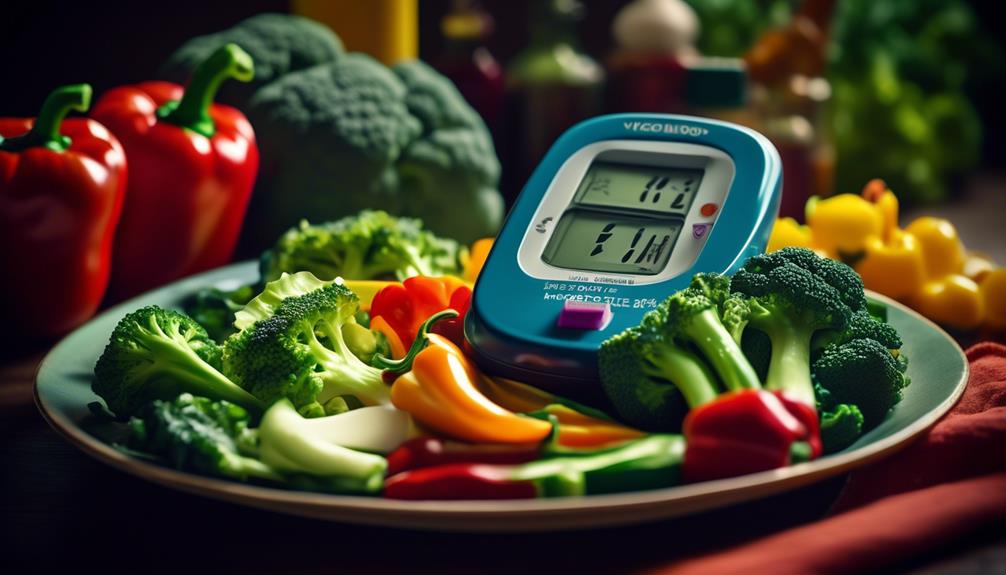When it comes to managing your diabetes, you know that diet plays a crucial role. But have you ever considered the power of low-carb vegetables in controlling your blood sugar levels?
These humble greens have a significant impact on your overall health, and their benefits for diabetes management are undeniable. From their impressive nutritional value to their ability to stabilize blood sugar, low-carb vegetables are a must-have in your meal plan.
So, if you're ready to discover the secrets behind these diabetes superheroes, read on to uncover the reasons why incorporating them into your diet is essential for your well-being.
Benefits of Low-Carb Vegetables for Diabetes

By incorporating low-carb vegetables into your diet, you can experience numerous benefits that help manage diabetes effectively. Low-carb vegetables are rich in essential nutrients and can provide you with a variety of nutritional benefits. These vegetables are packed with vitamins, minerals, and fiber, which are all crucial for maintaining stable blood sugar levels. They also have a low glycemic index, meaning they cause a slow and steady rise in blood sugar levels, preventing any sudden spikes or crashes.
Additionally, low-carb vegetables are low in calories and high in water content, making them a great option for weight management. They can help you feel full and satisfied without adding excess calories to your diet. This is especially important for individuals with diabetes, as maintaining a healthy weight is crucial for managing the condition effectively.
When it comes to cooking low-carb vegetables, there are various techniques you can use to maximize their nutritional benefits. Steaming, sautéing, and roasting are all great options that help retain the vegetables' natural flavors and nutrients. Avoid overcooking them, as this can lead to nutrient loss. Adding herbs and spices can also enhance the taste of low-carb vegetables without adding any extra calories or carbohydrates.
Incorporating low-carb vegetables into your meals can provide you with a wide range of nutritional benefits and help you effectively manage your diabetes. Experiment with different cooking techniques to make them a delicious and nutritious addition to your diet.
Nutritional Value of Low-Carb Veggies
Low-carb vegetables offer a range of health benefits, particularly for individuals with diabetes. These veggies are rich in essential nutrients like vitamins, minerals, and fiber, which are important for overall health and wellbeing.
Additionally, low-carb vegetables play a crucial role in controlling blood sugar levels, making them an excellent choice for diabetes management.
Health Benefits of Low-Carb Veggies
Including low-carb vegetables in your diet can provide numerous health benefits due to their rich nutritional value. Low-carb vegetables are packed with essential vitamins, minerals, and fiber, which are all vital for maintaining good health and managing diabetes.
These vegetables are low in calories and high in nutrients, making them an excellent choice for weight management. They're also high in antioxidants, which help fight inflammation and protect against chronic diseases.
Additionally, low-carb vegetables have a low glycemic index, meaning they've a minimal impact on blood sugar levels. This makes them suitable for individuals with diabetes who need to control their blood sugar.
To maximize the health benefits of low-carb vegetables, it's recommended to cook them using healthy techniques such as steaming, sautéing, or roasting, as these methods preserve the nutrients and enhance their flavors.
Role in Blood Sugar Control
To effectively manage blood sugar levels, incorporating low-carb vegetables into your diet is crucial due to their high nutritional value. These veggies play a significant role in blood sugar control, aiding in weight loss and improving insulin sensitivity.
Here are three reasons why low-carb vegetables are essential for regulating your blood sugar:
- Fiber content: Low-carb vegetables are rich in dietary fiber, which slows down the absorption of glucose into the bloodstream. This helps prevent sudden spikes in blood sugar levels and promotes more stable glucose control.
- Nutrient density: Low-carb vegetables are packed with essential vitamins, minerals, and antioxidants. These nutrients are vital for overall health and can support optimal blood sugar control.
- Hydration support: Many low-carb vegetables have high water content, helping to keep you hydrated. Staying hydrated is important for maintaining healthy blood sugar levels.
Incorporating low-carb vegetables into your meals can have a positive impact on your weight, insulin sensitivity, and blood sugar control. Make sure to include a variety of these nutrient-dense veggies in your diet for optimal diabetes management.
Impact of Low-Carb Vegetables on Blood Sugar

When it comes to managing your blood sugar levels, incorporating low-carb vegetables into your diet can have a significant impact. These vegetables contain fewer carbohydrates and a lower glycemic index, which means they've less of an effect on your blood sugar compared to high-carb options.
Blood Sugar Control
Consuming low-carb vegetables can play a crucial role in managing blood sugar levels effectively. By incorporating these vegetables into your diet, you can prevent blood sugar spikes and improve insulin resistance.
Here are three ways low-carb vegetables can help control your blood sugar:
- High in fiber: Low-carb vegetables are rich in dietary fiber, which slows down the digestion and absorption of carbohydrates. This helps prevent rapid fluctuations in blood sugar levels and promotes stable glucose control.
- Low glycemic index: Many low-carb vegetables have a low glycemic index, meaning they have a minimal impact on blood sugar levels. This can be especially beneficial for individuals with diabetes, as it helps maintain steady blood glucose levels throughout the day.
- Nutrient-dense: Low-carb vegetables are packed with essential vitamins, minerals, and antioxidants. These nutrients support overall health and can improve insulin sensitivity, allowing your body to effectively utilize glucose and maintain stable blood sugar levels.
Incorporating an array of low-carb vegetables into your meals can be a practical and effective strategy for managing blood sugar levels and promoting better diabetes management.
Glycemic Index Impact
Incorporating low-carb vegetables into your diet can have a significant impact on your blood sugar levels, thanks to their low glycemic index. The glycemic index (GI) is a ranking system that measures how quickly carbohydrates in food raise blood sugar levels. Low-GI foods have a score of 55 or less, while high-GI foods have a score of 70 or more.
Low-carb vegetables such as broccoli, spinach, and zucchini have a low GI, which means they cause a slower and more gradual rise in blood sugar levels. This is important for diabetes management because it helps prevent sudden spikes and crashes in blood sugar.
Role of Fiber in Diabetes Management
Including fiber-rich foods in your diet plays a crucial role in effectively managing diabetes. Fiber is a type of carbohydrate that isn't broken down by the body into sugar, making it an excellent choice for individuals with diabetes. Here are three reasons why fiber is essential for diabetes management:
- Blood sugar control: Fiber slows down the absorption of sugar in the bloodstream, preventing spikes in blood sugar levels. This can help individuals with diabetes maintain stable blood sugar levels throughout the day.
- Improved insulin sensitivity: Consuming fiber-rich foods can improve the body's sensitivity to insulin, the hormone responsible for regulating blood sugar. This can help individuals with diabetes better control their blood sugar levels and reduce the need for medication.
- Weight management: High-fiber foods are often low in calories and can help you feel fuller for longer. By including fiber in your diet, you can manage your weight more effectively, which is crucial for diabetes management.
Incorporating fiber-rich foods such as vegetables, whole grains, legumes, and fruits into your meals can help you maintain stable blood sugar levels, improve insulin sensitivity, and manage your weight. Aim for at least 25 grams of fiber per day for women and 38 grams for men to reap the benefits of fiber in diabetes management.
Top Low-Carb Vegetables for Diabetics

To effectively manage diabetes, incorporating low-carb vegetables into your diet is essential. Not only are low-carb vegetables packed with essential nutrients, but they also have a minimal impact on blood sugar levels. When it comes to weight loss, these vegetables are a great choice as they're low in calories and high in fiber, which helps you feel full and satisfied.
Some of the top low-carb vegetables for weight loss include broccoli, cauliflower, spinach, kale, zucchini, and bell peppers. These vegetables aren't only low in carbs but also rich in vitamins, minerals, and antioxidants that are beneficial for overall health.
When cooking low-carb vegetables, it's important to choose the best cooking methods to preserve their nutritional value. Steaming and sautéing are great options as they require minimal cooking time and help retain the vegetables' natural flavors and nutrients. Avoid deep frying or adding excessive amounts of oil, as this can increase the calorie content of the dish. Roasting vegetables is another delicious and healthy option, as it brings out their natural sweetness and enhances their flavor.
Incorporating these top low-carb vegetables into your diet and using the best cooking methods can't only help manage diabetes but also aid in weight loss. So, go ahead and fill your plate with these nutritious and delicious veggies to support your health and well-being.
Incorporating Low-Carb Veggies Into Your Diet
When it comes to managing diabetes and maintaining a healthy diet, adding low-carb vegetables to your meals is crucial. These nutrient-packed veggies not only provide essential vitamins and minerals but also help regulate blood sugar levels.
Incorporating low-carb vegetables into your diet can be easy and enjoyable. Here are three practical ways to do it:
- Low carb vegetable shopping: Make a list of low-carb vegetables before heading to the grocery store. Choose options such as leafy greens like spinach and kale, cruciferous vegetables like broccoli and cauliflower, and colorful options like bell peppers and zucchini. These veggies are low in carbohydrates and high in fiber, making them excellent choices for diabetes management.
- Meal planning with low-carb veggies: Plan your meals around low-carb vegetables to ensure a balanced and diabetes-friendly diet. Incorporate these veggies into salads, stir-fries, soups, and side dishes. Try roasted Brussels sprouts with garlic and olive oil, or a refreshing cucumber and tomato salad. Get creative and experiment with different recipes to keep your meals interesting and flavorful.
- Snack on low-carb veggies: Instead of reaching for high-carb snacks, opt for low-carb veggies as a healthy alternative. Carrot sticks, celery, and cucumber slices are excellent choices. Pair them with a protein-rich dip like hummus or Greek yogurt for a satisfying and blood sugar-friendly snack.
Cooking Tips for Low-Carb Vegetable Dishes

To enhance the flavor and texture of your low-carb vegetable dishes, try these cooking tips that will help you create delicious and diabetes-friendly meals. Cooking techniques play a crucial role in bringing out the best in low-carb vegetables, making them more enjoyable to eat. Whether you steam, roast, sauté, or grill your vegetables, each method adds a unique flavor and texture to your dish.
Steaming is a gentle cooking technique that helps retain the nutrients in the vegetables. It involves placing the vegetables in a steamer basket over boiling water until they're tender. Steamed vegetables are crisp, bright, and full of flavor.
Roasting is another great option for low-carb vegetables. This technique involves tossing the vegetables in olive oil, salt, and pepper, and then baking them in the oven until they're caramelized and tender. Roasted vegetables have a rich, smoky flavor that adds depth to your meals.
Sautéing is a quick and easy way to cook low-carb vegetables. Heat a small amount of oil or butter in a pan, add your vegetables, and cook them over medium-high heat until they're tender and slightly browned. Sautéed vegetables are delicious and can be used in a variety of dishes.
Grilling is a fantastic cooking technique that imparts a smoky flavor to your low-carb vegetables. Brush your vegetables with oil and season them with herbs and spices, then grill them over medium-high heat until they're charred and tender. Grilled vegetables are a great addition to salads, sandwiches, or even as a side dish.
In addition to cooking techniques, meal planning is essential when it comes to incorporating low-carb vegetables into your diet. Plan your meals in advance and include a variety of vegetables to ensure you get a wide range of nutrients. Experiment with different cooking techniques to keep your meals interesting and flavorful.
Low-Carb Vegetable Recipes for Diabetes Management
Enhance your diabetes management with delicious low-carb vegetable recipes that are both satisfying and beneficial for your health. Incorporating low-carb vegetables into your meals can help regulate your blood sugar levels and support weight management.
Here are three simple and nutritious low-carb vegetable recipes to include in your meal planning:
- Zucchini Noodles with Tomato and Basil: Spiralize zucchini into noodle-like strands and sauté them with cherry tomatoes, garlic, and fresh basil. This light and flavorful dish is a great alternative to traditional pasta and provides essential nutrients without the excess carbs.
- Cauliflower Fried Rice: Swap regular rice for finely chopped cauliflower in this Asian-inspired dish. Sauté the cauliflower with your choice of vegetables, such as bell peppers, carrots, and peas, and add soy sauce for extra flavor. This low-carb version of fried rice is packed with fiber and vitamins.
- Stuffed Bell Peppers: Cut bell peppers in half and remove the seeds. Fill them with a mixture of ground turkey, cauliflower rice, diced tomatoes, and spices. Bake until the peppers are tender and the filling is cooked through. These stuffed bell peppers are a satisfying and low-carb option for a hearty meal.
Incorporating these low-carb vegetable snacks and recipes into your meal planning can help you maintain stable blood sugar levels and support your overall diabetes management. Experiment with different vegetables, herbs, and spices to discover new flavors that will make your meals both enjoyable and nutritious.
Conclusion
So, next time you're at the grocery store, make sure to stock up on low-carb vegetables for your diabetes management. These nutrient-packed veggies not only provide essential vitamins and minerals, but also help regulate blood sugar levels and promote overall health.
By incorporating them into your diet and trying out some delicious low-carb vegetable recipes, you can take control of your diabetes and enjoy a tasty and nutritious way of eating.
Remember, small changes can make a big difference in managing your diabetes.







